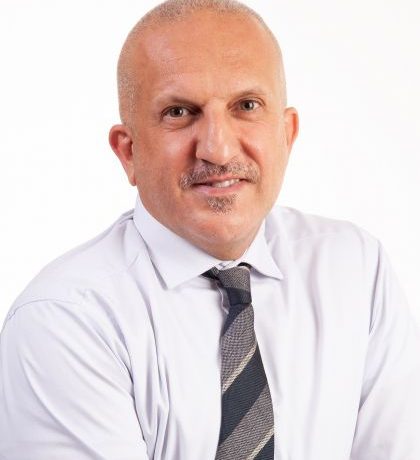by Bruna Zani, EFPA
EFPA is one of the 14 partners of the EU funded project H-WORK Multilevel interventions to promote mental health in SME’s and public workplaces. Bruna Zani from EFPA asked the project coordinator, prof. Luca Pietrantoni, Full Professor of Work and Organizational Psychology, coordinator of second cycle Degree in Work, Organizational and Personnel Psychology EMJMD WOP-P, Head of the research group on Human factors, Risk and safety at University of Bologna (Italy), to give some comments.
- Can you shortly describe the application procedure in which your team was involved. We heard about the complicated procedures: there were lots of applications but only few succeeded.
There is still this idea among organisations that Europe has a lot of money/funding to distribute but they all underestimate the difficult application procedure. Getting H-WORK funded by the European Commission has been a very complicated, competitive and challenging process, for which the involved team has really worked hard. It was a two-stage call for a Research and Innovation Action whereby many success criteria should have been met. One-hundred and thirty proposals were submitted, but only 5 were selected (success rate: 4%).
- How have you managed the activities considering that a lockdown was imposed just after one month from the kickoff? What has been the impact of the corona virus on the timing of the project?
Fortunately, the lockdown’s impact has not been so disruptive as it has probably been in other domains. This is because, being 14 partners located in 9 countries of Europe, Consortium members would have been forced to work remotely anyway. Of course, without the lockdown, we would have been able to travel abroad, for instance, visiting the different partners’ departments, labs and research teams, or joining conferences and events in physical presence to disseminate the project and to network with other members of the scientific community. Most of all, we would have been able to hold the second physical Consortium meeting. However, in terms of timing of the project activities, we managed to minimise the impact of the pandemic. Despite the unavoidable psychological impact of working from home while being aware that there is a global pandemic outside there, the “H-WORKers” have shown great resilience. Rather, we have faced the need to restructure and redesign some of the activities, which were foreseen to happen in physical presence, by taking advantage of digital communication technologies. For instance, we organized several webinars on different topics: positive psychology approaches to stress management, digital tools for team performance and team communication (Sociomapping), organizational interventions to promote wellbeing in the workplaces, CMO – Context Mechanism Outcome – realist evaluation for interventions.
- Some deliverables are already been submitted. What are the main results obtained up to now?
Many interesting results have already come out, even if the project has entered its actual empirical activities only during the current period. First, an H-WORK ethical framework to conduct research involving human participants has been developed. Admittedly, this has not been an easy work, as it has requested deep reflection to figure out how to conciliate research needs (i.e., collecting both qualitative and quantitative data from participants), on the one hand, and normative or legal requirements (above all, GDPR) about privacy, anonymity, confidentiality, security, and so on. After all, it is not to be excluded that such framework might be adopted by other researchers facing the same challenges. Second, an H-WORK theoretical and methodological framework has been achieved by gathering best practices in workplace mental health promotion which Consortium members had extensive expertise. We reasoned about multilevel interventions as it represents the main final goals of the project itself: how do we want multiple interventions to work together? How can we get a synergistic effect? Synergism comes from the Greek word “synergos” meaning working together. But how can we measure it in psychological intervention in complex organizations? Finally, the H-WORK Assessment Tool has been produced and is being currently tested throughout the analysis of the needs that each intervention sites display in terms of promotion of mental health at work.
- What are the main challenges and what the major obstacles?
Entering organisations is always difficult. You really need to engage all the relevant stakeholders (whether managers or employees) by clearly explaining why they might benefit from the activities you want them to take part in. You have to show that you are not just making them losing time that they might use to accomplish their job tasks. In this sense, negotiating with a target organisation is crucial. Also, you need to connect with them, with their language and way of doing things. Organisations have their own contextual peculiarities which you need to identify and get familiar with. In the project we have SMEs and large public organizations, so we need to find different strategies to obtain engagement and motivation.
- Is the stigma on mental health still present in the workplaces? How is it expressed? How is it possible to cancel/reduce it?
As part of WP2-related tasks, we have been analysing stigma and cultural aspects of mental health promotion in the workplace. Stigma on mental health at work is indeed still present. Particularly, it is connected to a phenomenon of not talking about mental health issues in the workplace due to fear of showing weaknesses. The cultural representation of workers is linked to a stereotype made of strengths, motivation, engagement, productivity and optimal performance. Often, the perceptions the others expect them to meet these characteristics, prevent workers from openly talk about their vulnerabilities, such as conditions of exhaustion, depletion, stress, burnout, and so on. This has been exacerbated during the COVID-19 pandemic, whereby stigma has been attached to health care operators as potential “infectors”. To this regard, information and awareness are important. Social identity interventions might also prove useful. For sure, organisational policies or just organisational signalling that workplace mental health issues matter, can positively change the logic of the extant culture.
- Are there differences in mental health problems at work linked to gender?
Through conducting interviews as part of needs analysis, we are already witnessing that there are mental health problems at work linked to gender. It is well known that women have a higher lifetime prevalence of mood or anxiety disorders than men. We need to be aware that objective inequalities and subjective experiences may influence women’s psychological and physical stress, physical and mental health, especially in male-dominated environments.
- And what about age differences?
During interviews, we have been reported problems related to the retirement age which is set by the law in the different EU countries. Some nurses, for instance, have to work long hours, even in night work shifts, while being 65 or even older. In this situation, carrying the cognitive and physical load of the work becomes difficult. Probably the H-WORK project will not be able to change the regulations, but can raise awareness on this, and suggest organisational policies and practices.
- What have you observed in these past months in the workplaces that were forced to adapt their work organisation and activities to the pandemic? have these changes affected the workers’ mental health, and if yes, how?
The scientific literature has shown the negative psychological impact of COVID-19 pandemic on mental health of health care workers, as well as workers in essential services and customer services. On the one hand, this is clearly related to feelings of fear of being infected, isolated, worry for oneself and others. On the other hand, this also relates to how frustrating can be to adapt to a new organisation of work, especially when you digitalise all work processes and procedures, and move all the organisational communications to teleconferencing platforms which are not always straightforward to learn and use. We are witnessing consistent phenomena in the different H-WORK intervention sites. Workers needs to be supported and accompanied to thrive in these new scenarios.
- What are the priorities of the project for the next months?
In the short term, the project aims at administering surveys and conducting semi-structured individual interviews with middle and senior managers, as well as focus groups with employees, in order to collect both quantitative and qualitative data which should be useful to identify the needs of each H-WORK intervention site in terms of workplace mental health promotion. Based on this participatory and bottom-up analysis, multilevel interventions should be designed and implemented which should be consistent to the previously gathered needs. The project has very recently (and finally) entered its implementation phase, after several months of theoretical and methodological preparation, so that the priority is now to exploit this phase as much as possible to create psychologically healthy workplaces around Europe.
- This is advocacy for psychologists on the highest level! some ideas, dreams maybe?
I do believe psychologists can contribute to societal challenges. In the next European research and innovation framework programme Horizon Europe, there are several opportunities for psychologists in different pillars, for example health and wellbeing. We psychologists need to be ambitious, be aware of our expertise and embrace transdisciplinarity to solve global and complex societal issues.
For example, let’s think about the digitalization and the fourth industrial revolution. How this is changing workplaces, working practices, the workforce and how we perceive work as well as the way we live. The exponential incorporation of technology in our daily lives has caused profound changes in the way we communicate and is likely to have significant impact both positive and negative on mental health. Digital platforms can provide mental health support as well as increase social inclusiveness. But technologies also introduce new risks, like continuous connectivity or exposure to inappropriate content.
- What about the cooperation with EFPA?
I am very honoured to work with EFPA staff in the project. EFPA is the leading Federation of National Psychologists Associations in Europe and will be involved in Work Package 2, collecting relevant information about regulations concerning mental health promotion in the workplace at European level. In the next two years, EFPA will also contribute to WP6 and WP7 organising workshops and a panel discussion at the European Congress of Psychology. EFPA will promote the H-WORK outcomes drawing upon seminars and workshop organized, developing policy briefs and recommendations and reaching about 300.000 European psychologists. I am confident that EFPA, together with the entire Consortium, will also use their contacts with the European commission and the European parliament to promote and inform policy makers about the H-WORK project and its outcomes.
- And finally, can you present your wonderful team at UNIBO?
The team at Unibo is interdisciplinary with a core group of psychologists. Marco de Angelis, Greta Mazzetti, and Davide Giusino are work and organizational psychologists and are working full time in the project activities. Dina Guglielmi and Rita Chiesa are senior researchers in work and organizational psychology. Roberta Biolcati is a clinical psychologist. Francesco Violante and Roberta Bonfiglioli are occupational health professionals. Elena Luppi and Aurora Ricci are experts in educational sciences and gender/age issues. Flavia Zanon is our project advisor for management issues. Edoardo Pische our new research assistant. And I am coordinating this great team!


